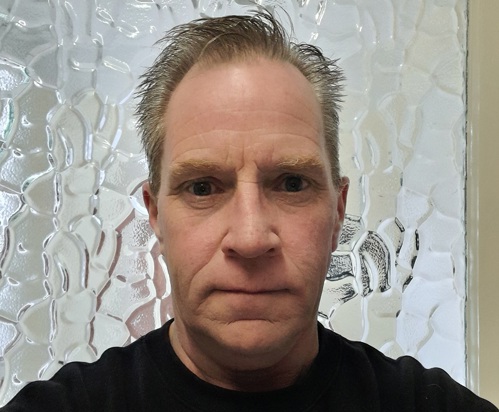Press release posted 3 May 2023
A father from Cheshire has become one of the first patients in the world to take part in a study by researchers working at Manchester’s internationally acclaimed cancer centre, The Christie, to measure the amount of oxygen in their tumour.
Tumours starved of oxygen (hypoxic cancers) are more challenging to treat successfully, particularly when radiotherapy is given. By measuring the amount of oxygen in a tumour in real-time, it is hoped that cancer treatment can be altered to target hypoxic tumours more effectively.
Truck driver Steven Brown, who lives in Poynton, took part in the study, along with 10 other head and neck cancer patients at The Christie.
The breakthrough combines two cutting-edge technologies: the research team adapted the highly sophisticated MR-linac machine at The Christie to measure tumour oxygen levels. The MR-linac combines an MRI scanner with the delivery of cancer-busting radiotherapy to ensure that treatment is incredibly precise.
Steven, age 54, first breathed room air through a mask and then pure oxygen to bathe the tumour with the gas. He was scanned on the MR-linac machine during this, and maps of oxygen levels were obtained.
The technique - called 'oxygen-enhanced MRI' - reveals which parts of a tumour are oxygen starved and likely to be resistant to radiotherapy.

Steven was first diagnosed with cancer in his throat and tonsils in August 2022 at Macclesfield District General Hospital after becoming aware of a strange sensation at the back of his throat. Following various camera investigations and a biopsy, Steven received the devastating news that he had cancer. “The news knocked me to the floor”, he said. “I was referred to The Christie for chemotherapy and radiotherapy that September.
"My mum, dad and auntie were all treated at The Christie, so I knew it was a world leader and that I was in the right place to be seen by the right people. I felt in safe hands and that I was getting the best available treatment.
"On one of my early visits, I was approached by Dr John Gaffney to see if I would be interested in taking part in the research study. He explained that they wanted to combine a normal MR scan with the introduction of oxygen to hopefully learn more about cancer and be able to treat it better. Having lost my mum and dad to cancer, I wanted to do something to help people in the future.
"I agreed to have the voluntary MR scans done. The first was as I was starting my radiotherapy treatment, then one when I was midway through, and one as my treatment ended.
"Although I won't directly benefit from this study, I know that taking part will help cancer patients in the future, and that's a great thing. It is only through people volunteering to participate in clinical studies in the past that doctors and scientists have been able to develop the cancer treatments we have today.
"My last treatment was on 11 November 2022, and I felt very tired after that and couldn't eat or drink properly. My taste buds stopped working, and I craved the taste of a cup of filtered coffee. I had a PET scan recently, but the result was inconclusive, as my throat is still very inflamed, so I will have another scan soon.
“I returned to work in January, and I'm feeling a lot better now and can eat properly again. My boss at work has been amazing throughout the whole thing as well as all my family and friends.”
Professor James O’Connor, senior group leader at The Christie, The University of Manchester, and The Institute of Cancer Research, led the study. He said: "Though it's clear more work needs to be done, we're very excited about the potential this technology has to enable daily monitoring of tumour oxygen, and we hope to be at a point soon when the technology will guide cancer doctors in how they can best deliver radiotherapy.
“This imaging lets us see inside tumours and helps us understand why some people with cancer need an extra boost to get effective treatment. This is an important step towards the goal of changing treatment based on imaging biology.”
Michael Dubec, MRI clinical scientist from The Christie and The University of Manchester, added: “The MR-linac is an exciting technology that combines highly precise imaging and radiotherapy delivery with real-time imaging.
“We are tremendously excited about what is the first application in humans of 'oxygen-enhanced MRI', developed as a result of a multi-disciplinary team working across the country.”
2 further oxygen-enhanced MRI studies will take place on the MR-linac at The Christie. The Bio-CHECC study will focus on patients with locally advanced cervical cancer, and the Hyprogen study, which will carry out imaging in patients with advanced prostate cancer.
The head and neck study was led by researchers from The Christie and The University of Manchester, working with scientists at the Institute of Cancer Research, University College London and The University of Leeds and funded mainly by the Medical Research Council.
Any patients interested in taking part in clinical trials should discuss this option with their consultant or GP. Not all patients will fit the criteria for a specific trial. While clinical trials can be successful for some patients, outcomes can vary from case to case.
